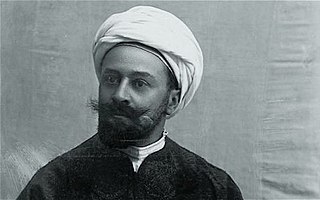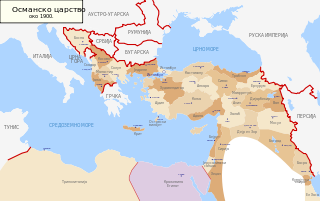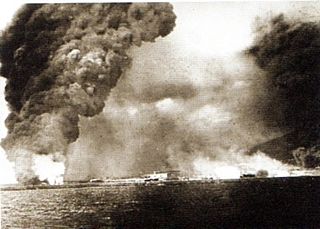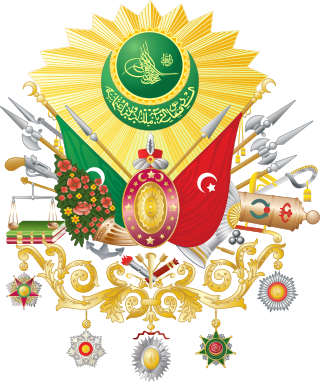Related Research Articles
In diplomatic history, the Eastern question was the issue of the political and economic instability in the Ottoman Empire from the late 18th to early 20th centuries and the subsequent strategic competition and political considerations of the European great powers in light of this. Characterized as the "sick man of Europe", the relative weakening of the empire's military strength in the second half of the eighteenth century threatened to undermine the fragile balance of power system largely shaped by the Concert of Europe. The Eastern question encompassed myriad interrelated elements: Ottoman military defeats, Ottoman institutional insolvency, the ongoing Ottoman political and economic modernization programme, the rise of ethno-religious nationalism in its provinces, and Great Power rivalries.

The identification of the causes of World War I remains a debated issue. World War I began in the Balkans on July 28, 1914, and hostilities ended on November 11, 1918, leaving 17 million dead and 25 million wounded. Moreover, the Russian Civil War can in many ways be considered a continuation of World War I, as can various other conflicts in the direct aftermath of 1918.

The Erzurum offensive or Battle of Erzurum was a major winter offensive by the Imperial Russian Army on the Caucasus Campaign, during the First World War that led to the capture of the strategic city of Erzurum. The Ottoman forces, in winter quarters, suffered a series of unexpected reverses, which led to a Russian victory.

The Baghdad railway, also known as the Berlin–Baghdad railway, was started in 1903 to connect Berlin with the then Ottoman city of Baghdad, from where the Germans wanted to establish a port on the Persian Gulf, with a 1,600-kilometre (1,000 mi) line through modern-day Turkey, Syria, and Iraq.

The Islamic Army of the Caucasus was a military unit of the Ottoman Empire formed on July 10, 1918. The Ottoman Minister of War, Enver Pasha, ordered its establishment, and it played a major role during the Caucasus Campaign of World War I.

Arbeiter-Illustrierte-Zeitung or AIZ was a German illustrated magazine published between 1924 and March 1933 in Berlin, and afterward in Prague and finally Paris until 1938. Anti-Fascism and pro-Communism in stance, it was published by Willi Münzenberg and is best remembered for the propagandistic photomontages of John Heartfield.
The Germany-Ottoman Alliance was ratified by the German Empire and the Ottoman Empire on August 2, 1914, shortly after the outbreak of World War I. It was created as part of a joint effort to strengthen and modernize the weak Ottoman military and to provide Germany with safe passage into the neighbouring British colonies.

Baron Max von Oppenheim was a German lawyer, diplomat, ancient historian, and archaeologist. He was a member of the Oppenheim banking dynasty. Abandoning his career in diplomacy, he discovered the site of Tell Halaf in 1899 and conducted excavations there in 1911–13 and again in 1927–29. Bringing many of his finds to Berlin, he exhibited them in a private museum in 1931. This was destroyed by Allied bombing in World War II. However, most of the findings were recently restored and have been exhibited again at Berlin and Bonn.

The Battle of Bitlis refers to a series of engagements in the summer of 1916 for the town of Bitlis and to a lesser extent nearby Muş, between Russian Imperial forces and their Ottoman counterparts. The town was the last stronghold of the Ottoman Empire preventing the Russians from entering Anatolia and Mesopotamia.

The German Caucasus expedition was a military expedition sent in late May 1918, by the German Empire to the formerly Russian Transcaucasia during the Caucasus Campaign of World War I. Its prime aim was to stabilize the pro-German Democratic Republic of Georgia and to secure oil supplies for Germany by preventing the Ottoman Empire from gaining access to the oil reserves near Baku on the Absheron Peninsula.
Oskar Ritter von Niedermayer was a German General, professor and a German spy. Sometimes referred to as the German Lawrence, Niedermayer is remembered for having led the 1915–1916 Persian and Indo-German-Turkish mission to Afghanistan and Persia during World War I in an endeavor to incite the Emir Habibullah Khan to attack British India, as a part of the Persian and Hindu German Conspiracy as an adjunct to the German War effort. Between the World Wars, Niedermayer was associated with the Universities of Munich and Berlin.
The League of East European States or Federation of East European States was a 1914 proposal by the German Committee for Freeing of Russian Jews for a German-dominated consociational buffer state to be established in the Russian Partition of the multi-ethnic territory of the former Polish–Lithuanian Commonwealth.

Gudrun Krämer is a German scholar of Islamic history and co-editor of the third edition of the Encyclopaedia of Islam. She is professor of Islamic studies, Chair of the Institute of Islamic Studies at the Free University of Berlin and a member of the Berlin-Brandenburg Academy of Sciences and Humanities. Her expertise is in topics related to modern Islamic history and in Islam, democracy, and modernity.

This is a bibliography of notable works about the Ottoman Empire.
The Berlin-Baghdad Express: The Ottoman Empire and Germany’s Bid for World Power is a book by Sean McMeekin, first published in 2010. It looks at efforts made by Imperial Germany during the First World War to use its connections with the Muslim world to defeat the British Empire, including directing an Islamic jihad against it.

The Black Sea raid was an Ottoman naval sortie against Russian ports in the Black Sea on 29 October 1914, supported by Germany, that led to the Ottoman entry into World War I. The attack was conceived by Ottoman War Minister Enver Pasha, German Admiral Wilhelm Souchon, and the German foreign ministry.

The Ottoman Empire came into World War I as one of the Central Powers. The Ottoman Empire entered the war by carrying out a surprise attack on the Black Sea coast of Russia on 29 October 1914, with Russia responding by declaring war on 2 November 1914. Ottoman forces fought the Entente in the Balkans and the Middle Eastern theatre of World War I. The Ottoman Empire's defeat in the war in 1918 was crucial in the eventual dissolution of the empire in 1922.

Sean McMeekin is an American historian, focused on European history of the early 20th century, especially regarding the origins of the First World War, and the role of Russia and the Ottoman Empire. He is currently Francis Flournoy Professor of European History and Culture at Bard College in upstate New York.

The Russian Empire gradually entered World War I during the three days before July 28, 1914. This began with Austria-Hungary's declaration of war on Serbia, a Russian ally. Russia sent an ultimatum, via Saint Petersburg, to Vienna, warning Austria-Hungary not to attack Serbia. Following the invasion of Serbia, Russia began to mobilize the reserve army on the border of Austria-Hungary. Consequently, on July 31, Germany demanded Russian demobilization. There was no response, which resulted in the German declaration of war on Russia on the same day. Per its war plan, Germany disregarded Russia and moved first against France, declaring war on August 3. Germany sent its main armies through Belgium to surround Paris. The threat to Belgium caused Britain to declare war on Germany on August 4. The Ottoman Empire soon joined the Central Powers and fought Russia along their border.

The Russian Revolution: A New History is a political history of the Russian Revolution written by Sean McMeekin and published by Basic Books in 2017. The release was timed with the 100th anniversary of the Russian Revolution.
References
- ↑ McMeekin, Sean The Berlin-Baghdad Express: The Ottoman Empire and Germany's Bid for World Power p344 (2010)
- ↑ Sirutavičius, Vladas and Staliūnas, Darius (editors) A Pragmatic Alliance: Jewish-Lithuanian Political Cooperation at the Beginning of the 20th Century Central European University Press (2011) p125
- ↑ McMeekin, Sean The Berlin-Baghdad Express: The Ottoman Empire and Germany's Bid for World Power (2010) p346